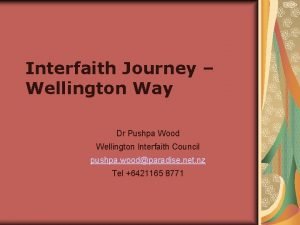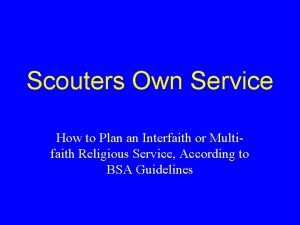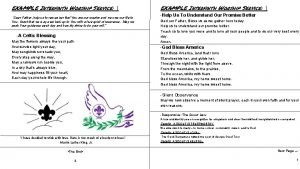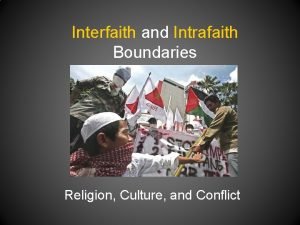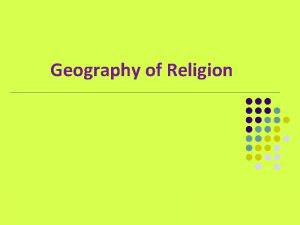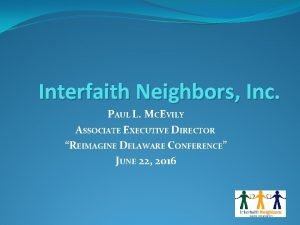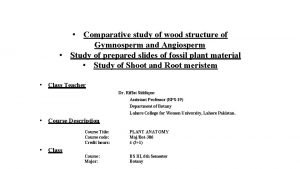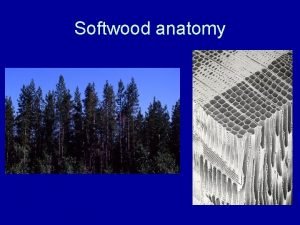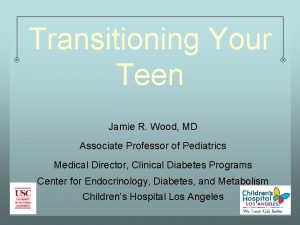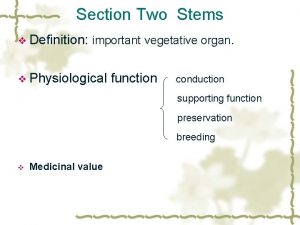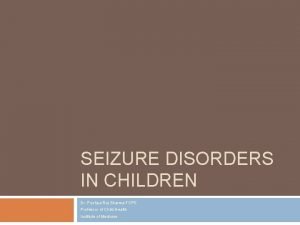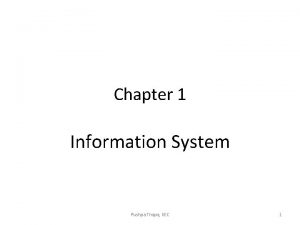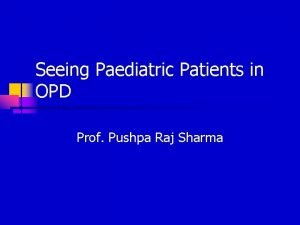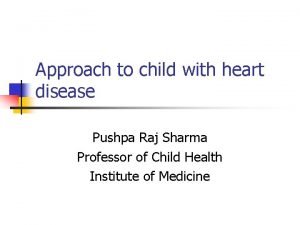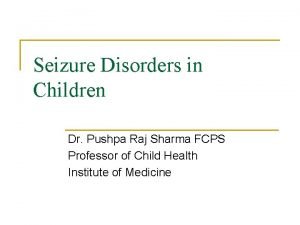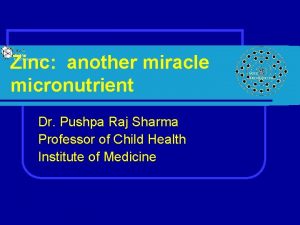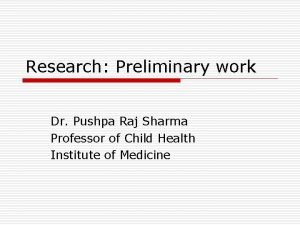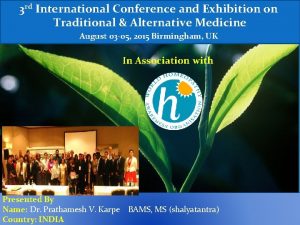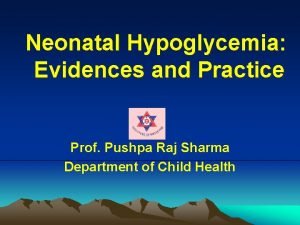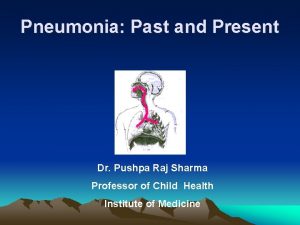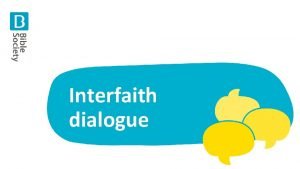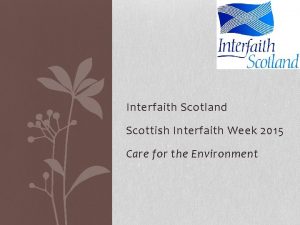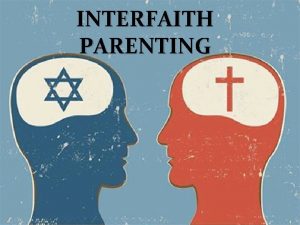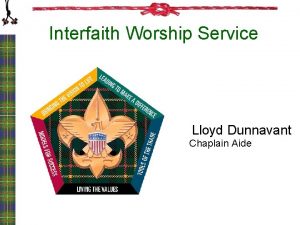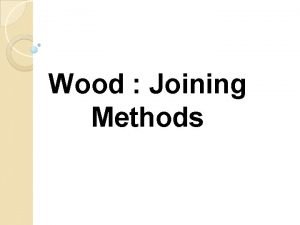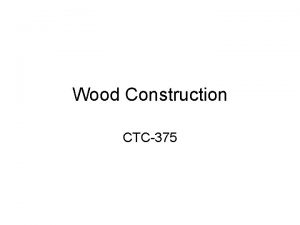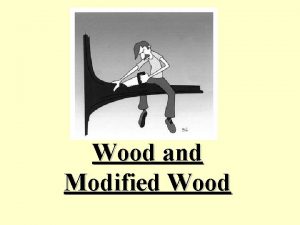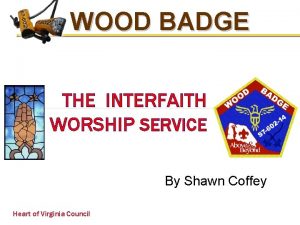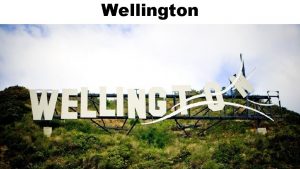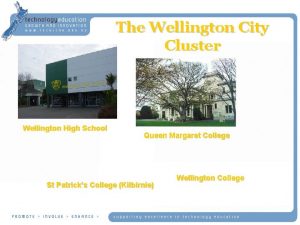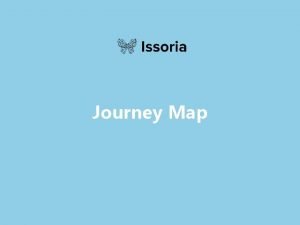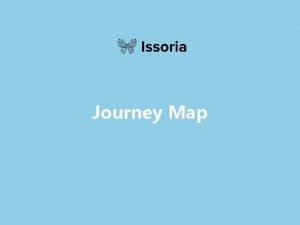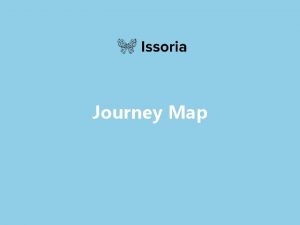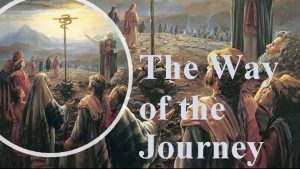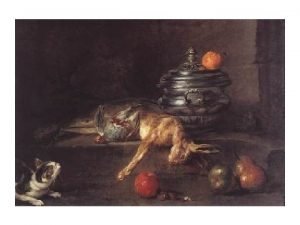Interfaith Journey Wellington Way Dr Pushpa Wood Wellington





















- Slides: 21

Interfaith Journey – Wellington Way Dr Pushpa Wood Wellington Interfaith Council pushpa. wood@paradise. net. nz Tel +6421165 8771


Brief History Started as an informal group around 1988 Some members were actively involved in World Conference of Religion & Peace (WCRP) 1990 -92 started to work with WN City Council to celebrate Faith & Community Week 1995 -96 negotiated an interfaith ceremony as part of the Commonwealth Day celebrations

Brief History- contd. 1990 onwards involved in World Week of Prayer for World Peace (WPWP) 1997 onwards community based interfaith activities increased and interest for interfaith activities evident in other regions as well Since 9/11 a Rapid Response Group became active and has successfully kept the ‘outside’ conflict ‘out of our community’ specially in WN region

Brief History – contd. 2002 a decision was made to organise the first National Interfaith Forum with encouragement from the Government 2003 a highly successful first National Interfaith Forum was organised Since then the group has become more formal in its operation and currently meets on a monthly basis

First National Interfaith Forum Key aim/vision of WN Interfaith Group is to enhance and encourage peace and harmony in the community through interfaith dialogue and understanding of other faith groups This aim/vision was reinforced at the first national forum in 2003

2003 Forum All participants were asked three key questions and participants were divided into small groups to discuss their response to each question. Out of that discussion key points/recommendations were collated

Three key questions How do you go about encouraging interfaith dialogue? What will be our legacy to young people? What do we really want to leave behind? Does your faith in particular and ‘religion’ in general has a role to play? What will that role be?

Some responses to these three questions:

How do you go about encouraging interfaith dialogue? Identify/strengthen core interfaith groups Establish spiritual discovery/discussion groups Visits to schools by multifaith delegation/s Steering committee – annual topic on social issues Encouraging faith communities to have dialogues on human rights and UN charter Involve children and young people

What will be our legacy to young people? What do we really want to leave behind? Structures that can promote understanding & ensure continuity of interfaith dialogue Respect for others who are different To move beyond tolerance Young people sharing cultural activities together through educational institutions, faith communities and community festivals

Does your faith in particular and ‘religion’ in general has a role to play? What will that role be? By 2013 establish a faith centre that will host parliament/parliamentarians Enlighten mainstream media Self-examination of our own tradition/s Separate cultural element from religion Develop NZ version of religion/spirituality Develop universal consciousness Christianity as a dominant faith to make/create space for minority faith groups

In essence, what did we really want? Peace, harmony and acceptance Inform ourselves and others Broaden our horizons and open up Derive strength from our diversity Develop inclusive structures and processes that empower all, regardless of faith, culture and ethnicity

Latest developments in WN Move from semi-formal structure to more formal structure Formal constitution Formal election of committee members Certain amount of despondency in minor faith groups

Interfaith tradition – National Scene Various individuals and organisations involved for the past 20 -25 years Formation of various Interfaith Councils in the country First National Interfaith Forum – 2003 with encouragement from the government First National Interfaith Women Forum -2005

Interfaith tradition – National Scene First National Interfaith Youth Forum – 2008 Active interfaith groups now in both islands Considerable amount of resource material being prepared by various individuals

Involvement of government agencies NZ Police produced interfaith resource book for their staff NZ Police, Office of the Ethnic Affairs, Ministry of Social Development, Families Commission and Human Rights Commission- regular participants in interfaith seminars/ conferences Involvement of local bodies/city councils

Involvement of government agencies- contd. National Diversity forum organised by the Human Rights Commission Active participation in Asia-Pacific Regional Interfaith Dialogue – NZ one of the four sponsors along with Australia Hosted one of these forum in NZ in 2007 Human Rights Commission provided leadership & support to the development of Statement of Religious Diversity

Census figures – 2001 & 2006 Religion/faith 2001 2006 Catholic Anglican 484, 821 584, 793 507, 771 554, 925 Hindus 39, 867 64, 557 Sikhs 5, 199 9, 507 Muslims 23, 634 36, 150 Buddhists No religion 41, 661 1, 028, 052 52, 392 1, 297, 104 (37%)

So what were the challenges along the way……. Informal vs formal structure Who should be part of the structure – which faith/s Funding for ongoing activities Organisational goals vs presonal aspirations People with hidden agendas – using the group for personal gains

Challenges – contd. Long-term/ sustainable energy Involving and energising new people into the group Interfaith vs. Intra-faith dialogue is more challenging Gender balance in membership and leadership Need for national network for long term sustainability Risk of being captured by interest groups Balance between ‘grass root’ and ‘academic’ interests and membership
 Pushpa wood name
Pushpa wood name Scouts own service ideas
Scouts own service ideas Interfaith worship service
Interfaith worship service Interfaith boundary
Interfaith boundary Hearth of christianity
Hearth of christianity Interfaith neighbors
Interfaith neighbors Gymnosperm structure
Gymnosperm structure Wood sawed wood old tongue twister
Wood sawed wood old tongue twister Early wood and late wood
Early wood and late wood Wood wood teenager
Wood wood teenager Early wood and late wood difference
Early wood and late wood difference Pushpa raj sharma
Pushpa raj sharma Pushpa thapa
Pushpa thapa Pushpa
Pushpa Pushpa x ray
Pushpa x ray Dr pushpa raj sharma
Dr pushpa raj sharma Dr pushpa raj sharma
Dr pushpa raj sharma Dr pushpa raj sharma
Dr pushpa raj sharma Shukrashmari
Shukrashmari Dr pushpa raj sharma clinic
Dr pushpa raj sharma clinic Pushpa raj sharma
Pushpa raj sharma Dr pushpa gross
Dr pushpa gross
